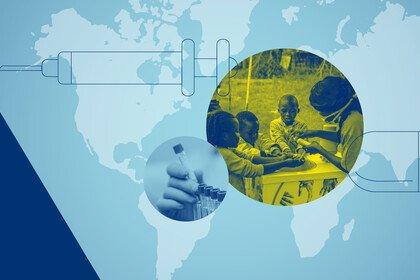
A year of Covid-19 – and a year of extraordinary science
The best of humanity has shone through the gloom of 2020. The dedication of scientists across the globe has been remarkable, not just for producing a string of lifesaving breakthroughs but for doing so at an unprecedented pace. Everyone who has supported the research response to Covid-19 can be proud. But the job isn’t finished yet, so we must redouble our commitments to put an end to the pandemic. Here is a selection of key moments in this great scientific success story.
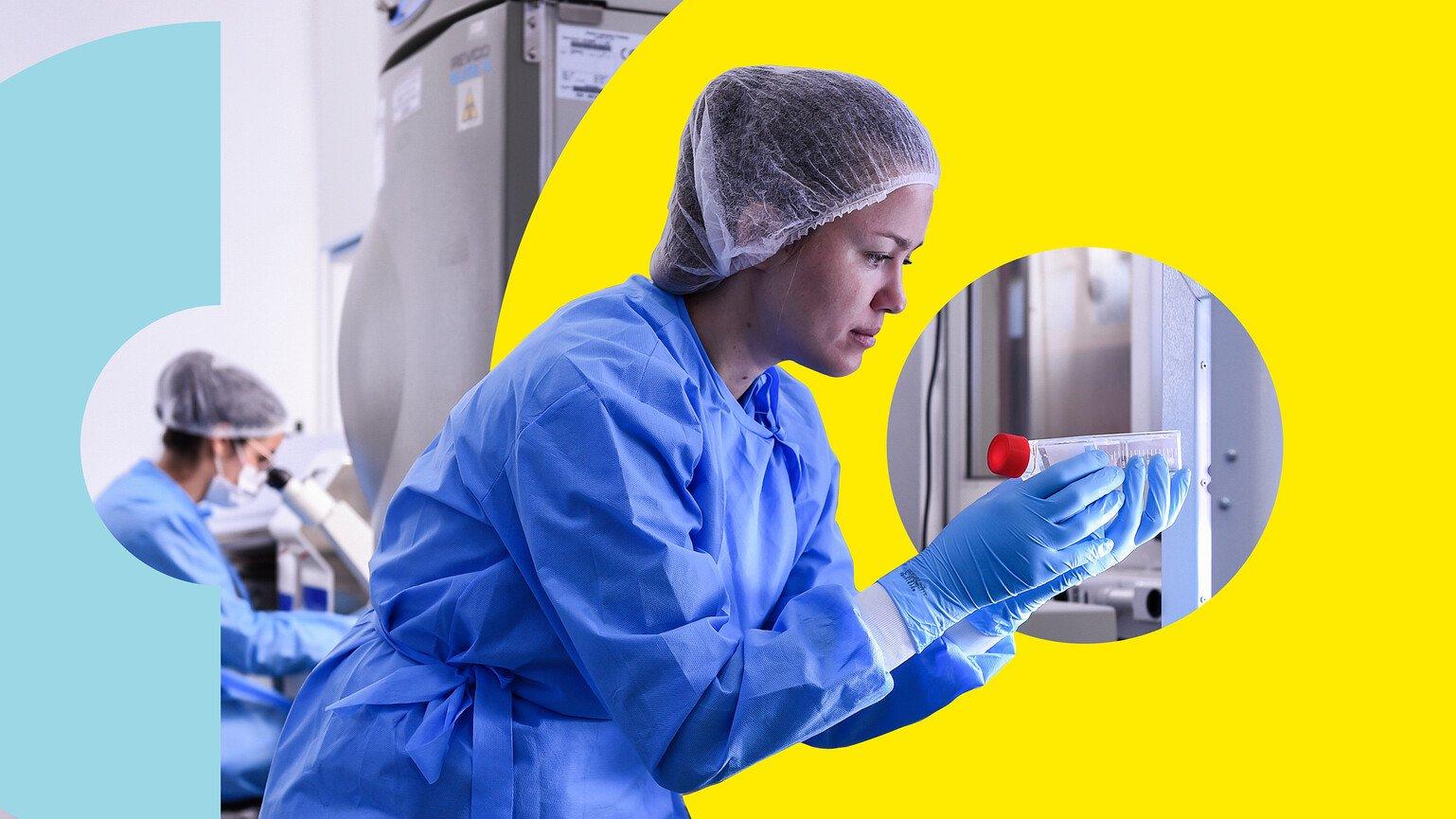
Pedro Vilela / Stringer via Getty Images
The world starts working to understand a mystery disease
The emergence and rapid spread of the novel coronavirus took the whole world by surprise. It soon became clear that this was a global health emergency that would require unprecedented action on many fronts. Key to the response was science: we needed to find out how this new disease affected people and how to stop it. Speed was essential, and research teams around the world wasted no time in getting to work.
- 1 January
One day after the first public statement about a pneumonia-like disease outbreak in Wuhan, China, the World Health Organization (WHO) activates an incident management team.
- 7 January
Chinese scientists identify a novel coronavirus as the cause of the outbreak.
- 11 January
The WHO announces it has received the genetic sequence of the novel coronavirus from China and will make this available for scientists worldwide to use in research.
- 23 January
The Coalition for Epidemic Preparedness Innovations (CEPI) announces that three vaccine research programmes have launched.
One of these involves Moderna. More programmes soon follow.
- 11 February
The WHO hosts a global research and innovation forum on the coronavirus.
Scientists and policy makers assess what they know about the virus and identify research priorities. A call for international funding to support this work follows.
- 28 February
More than 20 vaccines are in development globally, and several treatments are in clinical trials, the WHO announces.
For me, the recognition of scientists as first responders is really important. I witnessed all the scientists here working endless hours, every day, in the height of this pandemic when there was so much uncertainty. We didn’t know how susceptible we were, we didn’t know how to prevent catching it, but we showed up every day.
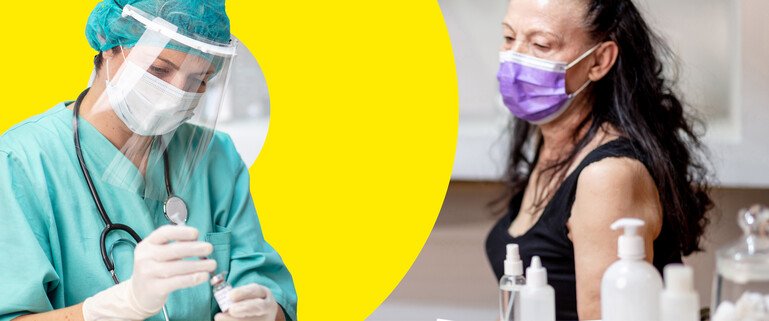
Zoranm / Getty Images
Major research efforts mobilise to develop tests, treatments and vaccines
As the spread of disease accelerated, so did the research effort. Major global collaborations were set up so that scientists could share their expertise, and plans were implemented to speed up clinical trials processes so that treatments, vaccines and diagnostics could be tested as quickly as possible, without compromising the safety of the participants. All this work needed funding, so governments, businesses and philanthropic organisations got together to start committing resources.
- 9 March
Covid-19 Therapeutics Accelerator launches to speed development of and access to treatments.
Funded by Wellcome, Bill & Melinda Gates Foundation and Mastercard.
- 16 March
First human trial of a Covid-19 vaccine starts, run by Moderna.
- 18 March
The WHO’s Solidarity clinical trial begins to look for effective treatments.
- 23 March
UK-based RECOVERY clinical trial begins, looking at treatments.
Thousands of Covid-19 patients in the UK are enrolled.
- 23 April
First trial participants receive Oxford/AstraZeneca vaccine candidate.
- 24 April
The WHO launches the ACT-Accelerator.
This global collaboration will support development of Covid-19 tests, treatments and vaccines.
- 29 April
First patients receive BioNTech/Pfizer vaccine candidate.
- 4 May
European Union holds pledging event, raising some of the funding needed for research.
Global leaders also commit to making sure that any Covid-19 vaccines, treatments and tests will be equitably accessible across the world.
The biggest successes that have come this year have been about team working and people putting the right outcome ahead of individual glory. People actually being focused on delivering a meaningful goal and working collectively as a team, whether that’s across a nation, across a continent or across a world, has been one of the biggest successes of this pandemic.
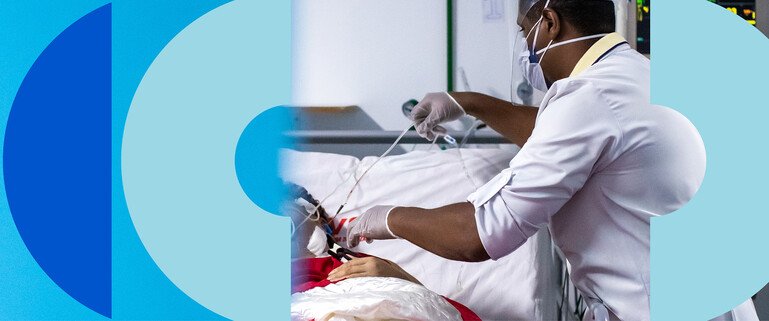
Buda Mendes / Getty Images
Early evidence on vaccines and treatments builds up
The accelerated research programmes started producing evidence faster than would have been possible even a few years ago. Some of these findings were positive about what worked and others negative, but all this new knowledge was crucial to show researchers and healthcare systems where to concentrate their work. Meanwhile, international collaborations were developing policies to make sure the eventual results of research could be delivered to people worldwide, quickly and equitably.
- 18 May
Early data shows Moderna’s vaccine candidate creates an immune response in humans.
- 1 June
First clinical trials of antibody treatments start, run by Eli Lilly.
- 5 June
Results from the RECOVERY trial show that hydroxychloroquine isn’t effective for hospitalised patients.
- 11 June
A second antibody treatment – Regeneron’s cocktail of two antibodies – starts clinical trials.
- 16 June
Results from the RECOVERY trial make dexamethasone the first drug known to improve survival rates in patients with Covid-19.
Within three weeks, ACT-Accelerator secures access to 2.9m treatment courses for low- and middle-income countries.
It's certainly shown that things can be done quickly. And that the quality of the science is what's allowed that to happen. There is obviously a caveat that we still need to build confidence and trust, that speed doesn't mean shortcuts, it doesn't mean a lack of quality.
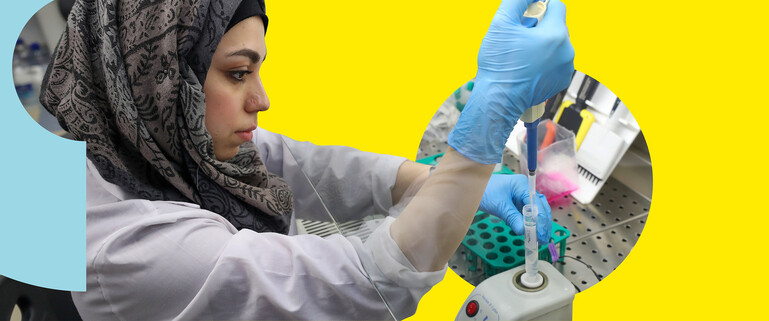
Yegor Aleyev / TASS via Getty Images
Research funding delivers results, but much more is still needed
The flow of potentially lifesaving discoveries continued. Even though the need was urgent, the clinical trials had to be conducted carefully and rigorously to make sure the participants were safe and the results were reliable. But researchers proved themselves able to make progress at record speed without making undue haste. More and more countries agreed on the need to make the results of these discoveries accessible to all, although the supply of funding to make this happen remained a crucial concern.
- 27 June
Pledging summit hosted by the European Commission and Global Citizen raises more funding for research.
Global leaders renew their commitment to produce and distribute treatments, tests and vaccines equitably across the globe.
- 29 June
The RECOVERY trial finds no clinical benefit from use of lopinavir-ritonavir in hospitalised Covid-19 patients.
- 14 July
Early results from Moderna’s vaccine show a consistent antibody response.
- 20 July
Early results from Oxford/AstraZeneca’s vaccine show it triggers an immune response.
- 27 July
Moderna’s vaccine starts enrolling patients for phase III clinical trial.
- 8 September
Oxford/AstraZeneca vaccine trial pauses to assess potential safety concern.
Resumes 4 days later.
- 14 September
Regeneron’s antibody treatment starts being tested as part of the RECOVERY trial.
- 21 September
156 countries agree to work together to make any new vaccines available to both rich and poorer countries.
This is the ACT-Accelerator's COVAX initiative.
Vaccines are just one tool for dealing with pandemics, a very effective tool, and alongside therapeutics, effective testing and public health measures of wearing your mask, washing your hands and social distancing, vaccines will help us to begin to return to a sense of normality, but we need a holistic approach.
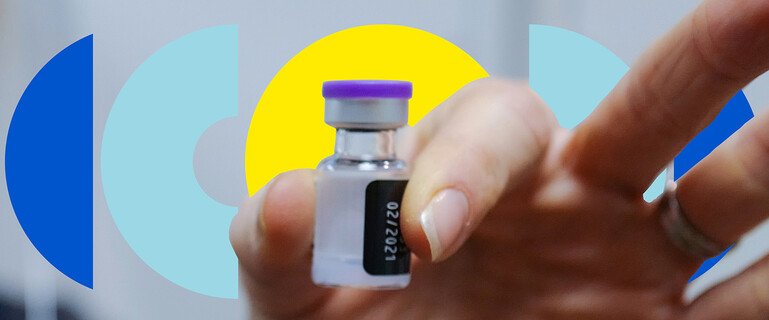
Hugh Hastings / Getty Images
We learn more about treatments – and vaccine results are spectacular
More studies provided vital information about what does and doesn’t work to treat Covid-19, and a string of excellent results from vaccine trials brought hope that the pandemic could soon be at an end. Never before in the history of medical science has such extraordinary progress been made, against a disease that the world had never heard of a mere 11 months ago.
- 29 September
Early data shows that Regeneron’s antibody treatment may help non-hospitalised patients recover faster.
- 30 September
World leaders pledge roughly $1bn for the ACT-Accelerator.
- 7 October
Early data from Eli Lilly suggests its monoclonal antibody treatment can reduce levels of virus in patients and prevent hospitalisations.
- 15 October
Interim results from WHO’s Solidarity trial are negative for several repurposed drugs.
Remdesivir, hydroxychloroquine, lopinavir-ritonavir and interferon have "little or no effect" on mortality or disease progression among hospitalised patients.
- 9 November
Pfizer/BioNTech vaccine shown to be more than 90% effective at preventing Covid-19.
- 16 November
Moderna vaccine shown to be 94.5% effective at preventing Covid-19.
- 23 November
Oxford/AstraZeneca vaccine shown to be at least 62% effective at preventing Covid-19.
Results suggest a different dosing regimen could give 90% effectiveness.
- 2 December
Pfizer/BioNTech vaccine becomes the first Covid-19 vaccine to be approved by any national government.
The UK authorises it for use, and vaccination starts less than a week later.
- 18 December
The US becomes the first country to authorise emergency use of the Moderna vaccine.
- 30 December
The UK is the first country to authorise the Oxford-AstraZeneca Covid-19 vaccine.
We have looked into the abyss of nationalism over the last five or ten years, and I think 2020 will be the year when we realise that is just not an option. And that international partnerships and collaboration are the only way to address these great challenges of the 21st century.
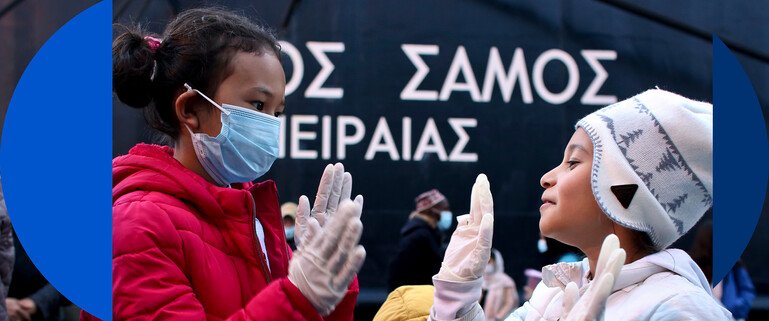
Milos Bicanski / Getty Images
The next chapter: deliver vaccines and develop treatments, for everyone
We mustn’t get overconfident after the good news on vaccines. It will still take a lot of work – and resources – to get billions of doses distributed around the world. While that happens, Covid-19 will continue to claim thousands of lives a day well into 2021.
This means it’s essential to keep up the research effort on finding better ways to treat Covid-19. And it’s essential to build the political will and infrastructure to make sure everyone in the world, rich and poor alike, can reap the benefits of the tremendous work science has achieved.
The work will need more funding. But we can be more confident than ever before that this funding will deliver results. 2020 will go down in history as the year of the pandemic. And 2021 can be the year we beat it.
We must deliver on the benefits of the scientific advances of 2020. We must deliver those to everybody in the world, wherever they are. And we must not create a more unequal world. We've talked about that – countries, scientists, philanthropists, funders – everybody has committed to that, and 2021 is the year we need to be held accountable to do that.
Governments and private and philanthropic funders can support research into and equitable access to Covid-19 tests, treatments and vaccines.

